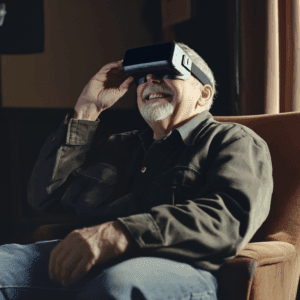For years, we’ve talked about aging in place. Now, with the rise of voice technology, that vision is getting a powerful new ally.
Once considered a novelty, voice assistants and speech-activated tools are now proving to be life-enhancing - and in some cases, life-changing - for older adults. From setting medication reminders to providing companionship and reducing isolation, voice tech is becoming an essential tool for independent living.
While most people know Alexa or Siri, a new wave of voice-first technologies specifically designed for older adults is emerging - and they’re worth paying attention to.
Why Voice Technology Matters for Seniors
As people age, certain tasks become more difficult:
- Tapping and typing on small screens
- Navigating complex menus
- Remembering daily tasks or appointments
Voice technology bypasses these barriers with a simple solution: just speak.
Whether managing household tasks, getting news updates, or calling a family member, voice interfaces offer accessibility, ease, and empowerment - no tech skills required.
Voice tech is especially useful for seniors who:
- Live alone
- Have limited mobility or dexterity
- Experience cognitive changes
- Prefer minimal screen interaction
👉 Related reading: How Smart Speakers Support Mental Health in Seniors
Beyond Alexa: Innovative Tools You Might Not Know About
While Amazon Alexa, Google Assistant, and Apple’s Siri dominate the conversation, several lesser-known but promising technologies are gaining ground - many designed specifically for the aging population.
Pria by Black+Decker
Pria is a voice-activated medication management robot and companion. It dispenses medications at the correct time, offers reminders, and even allows for two-way video calls with caregivers.
It features a friendly interface designed for seniors who may be uncomfortable with traditional tech - and it's shaped like a smiling robot for added approachability.
LifePod
LifePod is a proactive voice assistant designed specifically for older adults. Unlike reactive devices (which only respond when spoken to), LifePod initiates conversation based on the user’s schedule, health goals, and routine.
It offers:
- Medication reminders
- Wellness check-ins
- Hydration and nutrition prompts
- Mood tracking via voice
It integrates with caregivers, allowing remote customization of reminders and real-time updates.
MyndYou Voice Bot
MyndYou is an AI-driven voice bot that passively tracks cognitive and behavioral patterns through natural phone conversations.
How it works:
- The senior gets a friendly call from a voice bot that chats like a real person.
- AI listens for subtle changes in speech patterns that might indicate a decline in memory, mood, or cognition.
- Alerts are sent to caregivers or care teams if anomalies are detected.
This tech is a non-invasive way to spot early red flags in brain health.
ElliQ
ElliQ is a social robot and voice companion developed specifically for aging adults. Designed by Intuition Robotics, it sits on a table and initiates conversation, encourages walking, offers mindfulness sessions, and checks in on wellbeing.
What makes ElliQ unique:
- It uses body language, tone, and proactive engagement.
- It remembers past conversations.
- It connects to calendars, music, and caregivers.
It’s built to reduce loneliness and support health goals.
🔗 More info: elliq.com
What Voice Tech Can Help Seniors Do
Here’s how voice tools are helping seniors thrive independently:
- Reminders: for medications, hydration, and appointments
- Social connection: with voice-activated calling and check-ins
- Entertainment: music, jokes, trivia, news, audiobooks
- Wellness support: sleep prompts, mindfulness, movement reminders
- Emergency help: calling for assistance hands-free
The best part? These tools don’t just help seniors - they reduce caregiver stress too.
Tips to Encourage Voice Tech Use
For older adults unfamiliar with voice assistants, the first step is often building comfort and trust. Here’s how to help:
- Demonstrate: Show how easy it is with one or two simple commands.
- Start small: Set it up to answer “What’s the weather?” or “Play old jazz.”
- Use personalization: Set reminders using familiar voices or phrases.
- Avoid overload: Limit functionality to 3-5 key uses at first.
- Frame it as empowerment, not monitoring.
👉 Internal link: How to Help Seniors Track Their Symptoms
Final Thoughts
Voice technology isn’t just a convenience - it’s a bridge. A way to connect seniors to information, support, loved ones, and even themselves. As AI and conversational tech evolve, these tools will only get smarter, safer, and more personalized.
The future of aging is hands-free, voice-first, and driven by empathy.
And it might just be speaking to us now.








